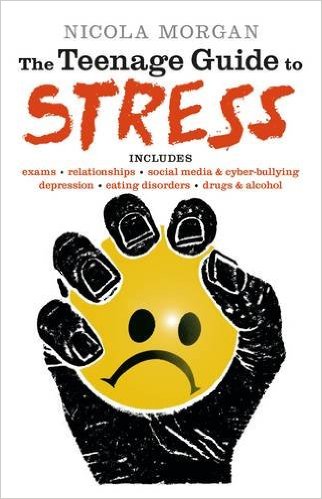„THE TEENAGE GUIDE TO STRESS” de Nicola Morgan
 Aparent, adolescenții ar trebui să aibă o viață ușoară. Încă nu sunt angajați, nu trebuie să se îngrijoreze cu plata impozitelor, a chiriei sau a asigurărilor. Și totuși, au și ei grijile lor: examene, presiunea să aparțină unui grup, presiunea să fie „cool”, schimbările hormonale, teama de viitor.
Aparent, adolescenții ar trebui să aibă o viață ușoară. Încă nu sunt angajați, nu trebuie să se îngrijoreze cu plata impozitelor, a chiriei sau a asigurărilor. Și totuși, au și ei grijile lor: examene, presiunea să aparțină unui grup, presiunea să fie „cool”, schimbările hormonale, teama de viitor.
Iar noi, ca părinți, cîteodată uităm că am fost și noi adolescenți.
M-am bucurat că Nicola Morgan, avînd compasiune pentru adolescenți, m-a lămurit în capitole diferite despre: sentimente, atracția sexuală, droguri, cyber-bullying. Și pentru fiecare capitol în parte, nominalizeaza problemele dar ne sugerează și strategii la care ne putem gîndi. Evident nu există soluții universal valabile, dar măcar putem să ne uităm altfel la situații reale.
De aceea, nu trebuie să citiți cartea de la început pînă sfîrșit, dacă nu aveți timp. Puteți, pur și simplu, să citiți doar capitolul care vă interesează în acel moment.
Feeling angry
„Pretty much everyone feels angry sometimes. It doesn’t mean you’re a bad person. Some feelings of anger come from not being in control.
But feeling angry very often or all the time is not a good thing; it will distract you from focusing properly and may harm relationships with friends and family.”
Feelings of Failure
„Schools push you to do your best at everything, and when your best isn’t good enough, it feels like failure.”
Alcohol and Drugs
„When teenagers use alcohol, they do it for many reasons: because taking risks can be fun, because of peer pressure or the desire for rebellion, and because it can make you feel more confident and relaxed.”
„The truth is that both alcohol and drugs are extremely dangerous for a load of reasons.
And you may not know that they affect teenagers more than adults, for reasons that we don’t exactly understand, except that the teenage brain just seems to be extra vulnerable.”
Bullying
„Bullying can take many forms. It can be name-calling, making up lies about you, minor physical things such as pinching or pushing, stealing or damaging your possessions, saying nasty things about you behind your back or on the internet, threatening you, sending offensive texts or making offensive or silent phone calls.”
Kindle, 2014

Recent Comments